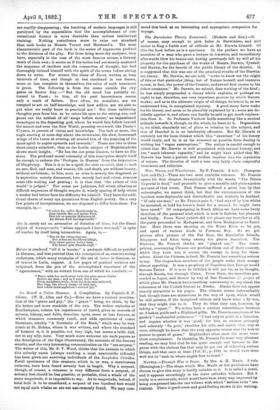opens his first chapter dramatically with the words, "The Prince
Imperial is dead," and proceeds to give a sensible and plain-s poken account of that event. That France suffered a great loss by that catastrophe, we cannot think, but that the circumstances of the incident were deplorable and discreditable can scarcely be doubted. "If only one man," as Mr. Francis puts it, "had stayed by him whilst he mounted, or held his horse's bead for a second, he might have been saved." Of campaigning in South Africa we have some lively sketches, of the personal kind which is now in fashion, but pleasant and kindly. From Natal (which did not please our traveller at all) the party proceeded to Madagascar, and from Madagascar to Zanzi- bar. Here there was shooting on the Wami River to be got, and sport of various kinds in Formosa Bay. Sa we get picture after picture of the Far East, the Seychelles Islands, Singapore and Siam being among the places described. The Siamese, Mr. Francis thinks, are "played out." The enter- prising, unwearying Chinese are pushing them out of their country, which they have not, it seems, the energy to keep for them- selves. About the Chinese, indeed, Mr. Francis has something serious to say. The stupendous numbers of the people make their energy almost appalling. It was a prophecy of Napoleon that Europe would become Tartar. If it is to be fulfilled, it will not be, as he thought, through Russia, but through China. From Siam, the travellers pro- ceeded to Japan, and thence by way of San Francisco (a propos of which place Mr. Francis has something noteworthy to say about the coherence of the United States) to Alaska. Alaska does not appear exactly attractive in his pages. The climate seems indescribably bad, though there are attractions in the way of sport, which would be still greater, if the benighted salmon only knew what a fly was, that they might rise to it They do what they can, however, by taking a "spoon." We notice here a curious resemblance between an Alaskan guide and a Highland gillie. Mr. Francis complains of his guide's "confounded politeness." "I had only to point in a direction, and inquire whether it was good,' for him to answer promptly and solemnly Za goat,' shoulder his rifle, and march that way at once, although he knew that the very opposite course was the best to pursue in quest of game." Highlanders often show the same vexa- tious complaisance. In thanking Mr. Francis for some very pleasant reading, we may hint that he has quite enough real humour to dis- pense with the obvious fun that may be got out of ridiculing serious things, and that once at least (Vol. II., p. 110) he would have done well not to "rush in where angels fear to tread."


































 Previous page
Previous page